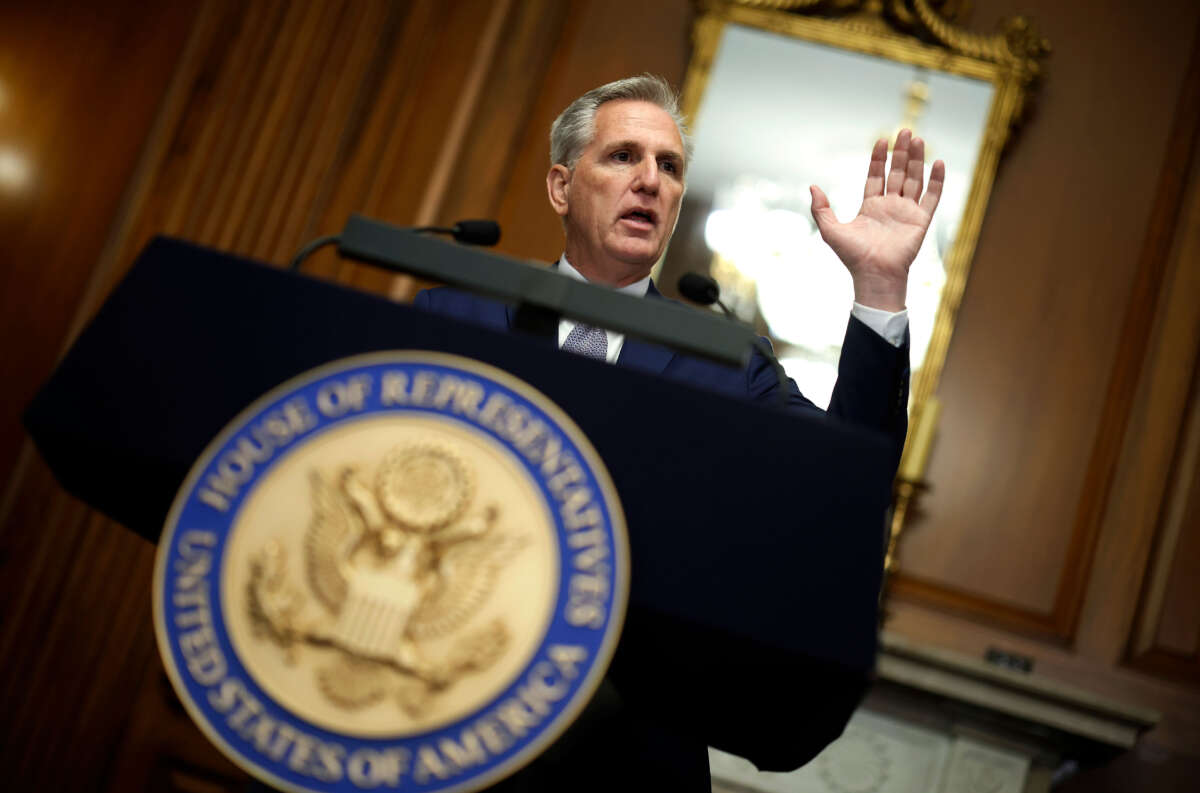Did you know that Truthout is a nonprofit and independently funded by readers like you? If you value what we do, please support our work with a donation.
A full week after he was ousted from his position as Speaker of the House of Representatives, Rep. Kevin McCarthy (R-California) has said that he’s open to running for the speakership again, despite previously saying he wouldn’t pursue the role.
The former speaker’s indecision will likely complicate the task of selecting a new speaker, which is poised to begin this week.
Republicans are preparing for what will likely be a long, drawn-out process to select someone to fill the constitutionally required position. A majority of the 435-seat House is needed to select a speaker; as the GOP has 222 seats in the House, the party is technically able to select someone on their own. However, deep factioning within the Republican conference in that chamber has made it difficult for any of the declared candidates so far to come close to attaining the 218 votes needed.
Indeed, if just five members of the Republican conference vote against the top vote-getter, they will fail to become speaker.
Republican Reps. Steve Scalise (Louisiana) and Jim Jordan (Ohio) have both announced that they are running. On a recent radio program, McCarthy didn’t formally announce that he’s running for his old job, but vowed to do “whatever the conference wants” if they select him again.
It took McCarthy 15 ballots over the course of several days to become speaker of the House in January — and that was when he had “frontrunner status” within his party. Without either Scalise or Jordan having that status, and with McCarthy potentially entering the fray, it’s possible that the process will take much longer, requiring many more ballots.
Three House Republicans still loyal to McCarthy have indicated that dozens of lawmakers in the House would vote for him on the first ballot for speaker, if given the opportunity to do so. Two of those three have promised to only vote for McCarthy, among the options that currently exist — narrowing the threshold to select a speaker even further, if most of the conference doesn’t back him.
Although McCarthy is the former speaker and lost his seat by only eight votes last week, his candidacy would be a longshot, as his removal demonstrated an inability to appease the differing factions within his conference.
McCarthy’s entrance into the speakership debate would also contradict what he seemingly promised last week — that he wouldn’t actively run for the speakership after being ousted. If he decides to run now, it would indicate a wishy-washy governing style — hardly the kind of leadership that Republicans are likely seeking at this tumultuous time, particularly in light of reports indicating that McCarthy was considering resigning from Congress altogether over the past week.
The situation is troubling many political and historical academics, who told The Washington Post last week that the ability of a small number of Republicans to remove a sitting speaker of the House was perhaps demonstrative of a crumbling democracy.
“We are watching a very small number of folks from the House Republican conference have an outsize role in promoting a lot of congressional dysfunction and fiscal dysfunction,” Laura Blessing, senior fellow at the Government Affairs Institute at Georgetown University, told the Post.
“If you want to know what it looks like when democracy is in trouble, this is what it looks like. It should set off alarm bells that something is not right,” said Daniel Ziblatt, professor of government at Harvard University.
A terrifying moment. We appeal for your support.
In the last weeks, we have witnessed an authoritarian assault on communities in Minnesota and across the nation.
The need for truthful, grassroots reporting is urgent at this cataclysmic historical moment. Yet, Trump-aligned billionaires and other allies have taken over many legacy media outlets — the culmination of a decades-long campaign to place control of the narrative into the hands of the political right.
We refuse to let Trump’s blatant propaganda machine go unchecked. Untethered to corporate ownership or advertisers, Truthout remains fearless in our reporting and our determination to use journalism as a tool for justice.
But we need your help just to fund our basic expenses. Over 80 percent of Truthout’s funding comes from small individual donations from our community of readers, and over a third of our total budget is supported by recurring monthly donors.
Truthout has launched a fundraiser to add 432 new monthly donors in the next 7 days. Whether you can make a small monthly donation or a larger one-time gift, Truthout only works with your support.
